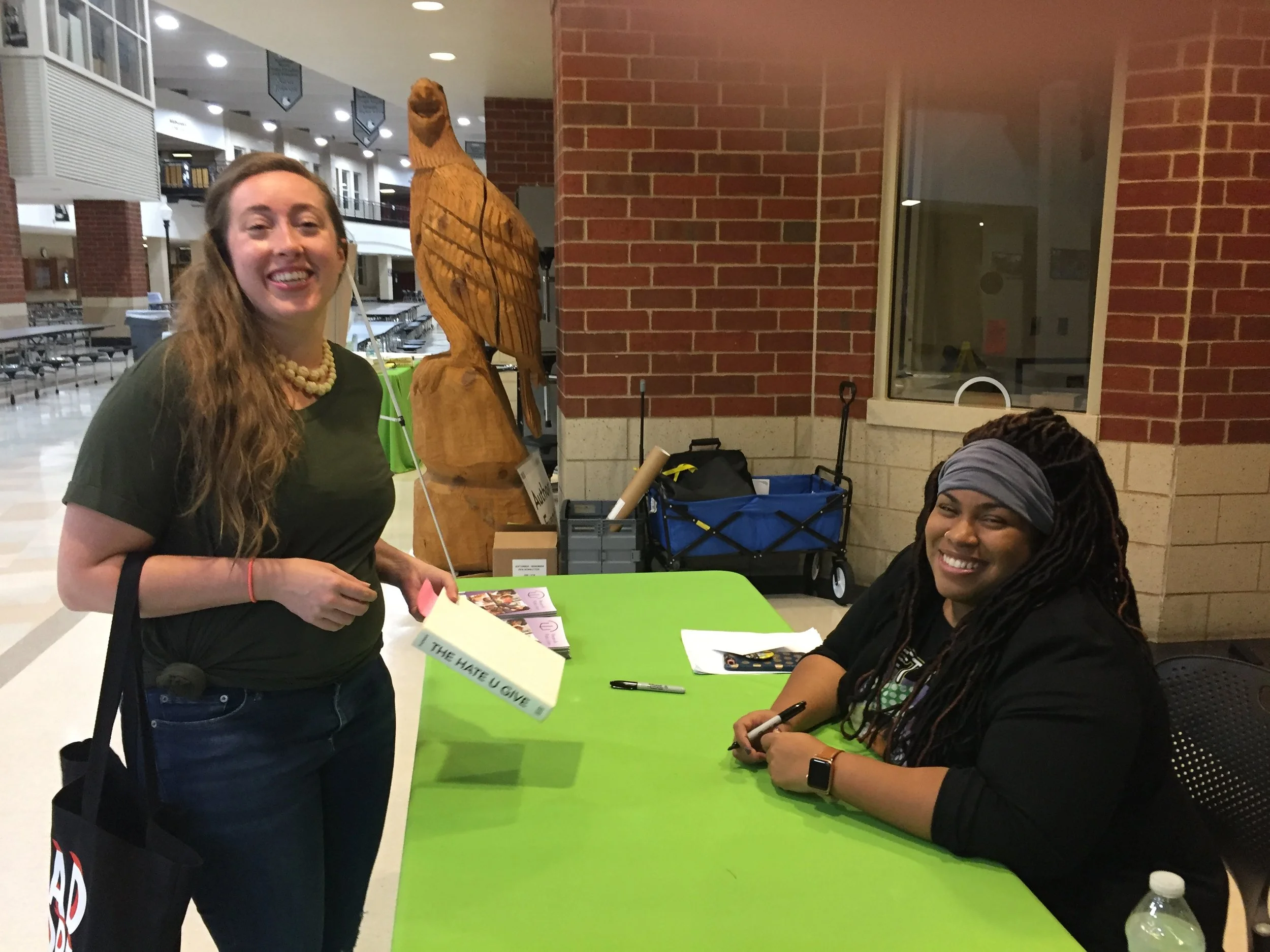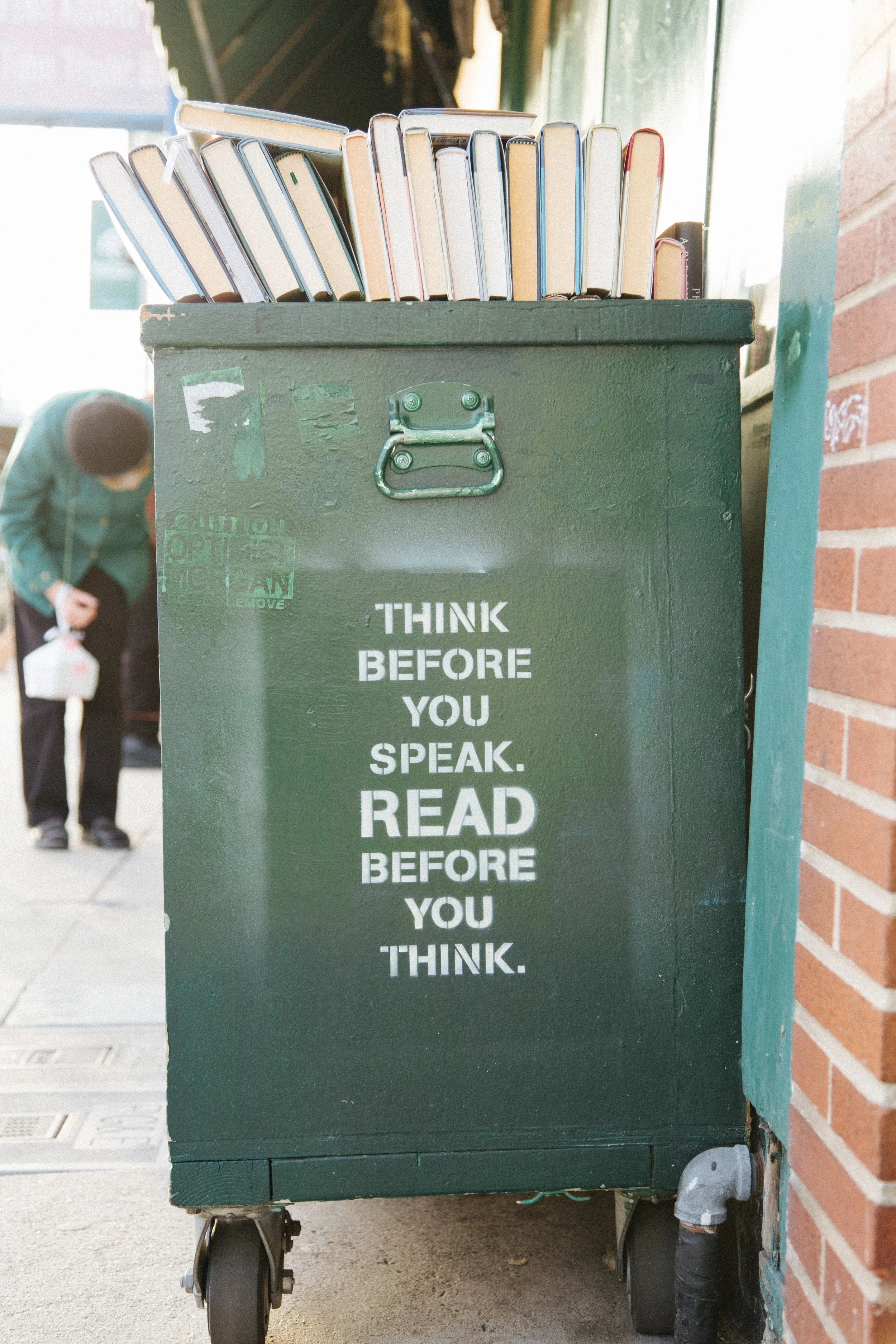The Personal and Political with Angie Thomas
[image description: A photo of me (Mandy, white female with long brown hair, a green t-shirt, and jeans) holding a copy of the book The Hate U Give out to the author Angie Thomas (black female, long black hair pushed back in a gray headband and a black shirt) for her to sign. We’re separated by a table and are both smiling at the camera.]
I’m so in awe of Angie Thomas it’s hard to even articulate how brilliant she is.
When I heard she was coming to Columbus last fall, I snatched my ticket the minute I heard. Good thing too because she packed a massive auditorium. I don’t know how many people were there that night, but I know I waited in line for 3.5 hours to get my book signed.
It was worth it.
I took notes during her talk. Being from Alabama myself, I was immediately sucked in when she started talking about what it was like growing up in Mississippi and how it influenced her writing. She put it bluntly: “Mississippi is known for two things: writers and racism. I’m a writer writing about racism, so I’ve got my bases covered.”
In case you don’t know what book she’s referring to (and good lord, I hope you do! it’s phenomenal!) it’s The Hate U Give, her YA novel about a young black girl who witnesses one of her best friends, who is unarmed, get shot and killed by a cop. From there, she has to reckon with what that means for her: feeling like she’s next, feeling an obligation to speak up while wanting to disappear, reckoning with the uncle she loves being a cop in a different precinct, the reaction from the white kids at her school where she’s a minority. There’s a lot to unpack and Angie does it so, SO well.
Though the novel isn’t set in a particular place but rather a general Anywheresville city (since police brutality happens everywhere), living in Mississippi, especially during post-Civil Rights Movement times is a cornerstone in Angie’s life and work.
Angie’s mother heard the gunshots that took Medgar Evers’ life. Her grandmother was supposed to go to that meeting at Medgar’s house the night he was killed, but they got word beforehand that racists would be on the prowl, so they all stayed in their homes with the lights off and windows closed.
She heard this family story growing up and she went on to say, “When I was six years old, I saw a picture of Emmett Till in a magazine and said, ‘What is this?’ My mom said, ‘Not what, baby. Who.’”
She took his death personally because he looked like boys in her neighborhood. He looked like her friends older brothers. He looked like people she knew.
Angie’s mother told her: “Know your worth, but know that everyone won’t value you like I do.”
A common question Angie gets is whether The Hate U Give was in any way autobiographical, so she enumerated on the parts that were:
Angie has a cousin who’s a cop and that’s who inspired the Uncle Carlos character.
Angie went to a predominantly white, private Christian high school where she had to do a lot of code switching between her school and her home.
The Haley character––the racist friend––was based on a real person.
The real life Haley didn’t know she was Haley in the book. She would say things like “that’s where the criminals live!” when talking about Angie’s neighborhood. After real life Haley read the book she called Angie to find out who that character was based on and Angie had to awkwardly tell her to look in the mirror.
Oscar Grant was killed while Angie was in high school and many of her white classmates said he deserved to die. They couldn’t understand why Angie and the black community at large was mourning him.
She didn’t know how to heal from these experiences, so Angie wrote a short story about Starr and Khalil in college and a creative writing professor encouraged her to turn it into a novel. But the idea of doing that was exhausting and she honestly thought another unarmed black man being killed by police wouldn’t happen again after Oscar Grant.
But then Trayvon Martin happened. Her very existence in a black female body is political and politics were beginning to feel more personal by the minute. She said, “It’s one thing to look at Tamir Rice and feel sorry for his family. It’s another thing when you mourn him as family.”
To the people who criticized her for being upset at unarmed black people being killed in the streets by cops just because she didn’t know them personally, she said, “Remember that when people call you a snowflake, an avalanche is essentially a bunch of snowflakes banding together.”
It was the culmination of all these experiences when she decided to turn the short story into the novel we now know as THUG. It’s been met with a lot of praise but also a lot of criticism, the latter coming almost exclusively from white parents who don’t want their kids reading the content. People who haven’t read The Hate U Give like to jump to conclusions and say it’s anti-police, but it’s not. It’s anti-police brutality. Angie’s take on the matter boils down to the idea that if black kids can live this reality the least white kids can do is read about it.
I agree wholeheartedly. The Hate U Give was one of my favorite books of 2017 and I recommend it at every available opportunity. I hope you’ll give it a read.






